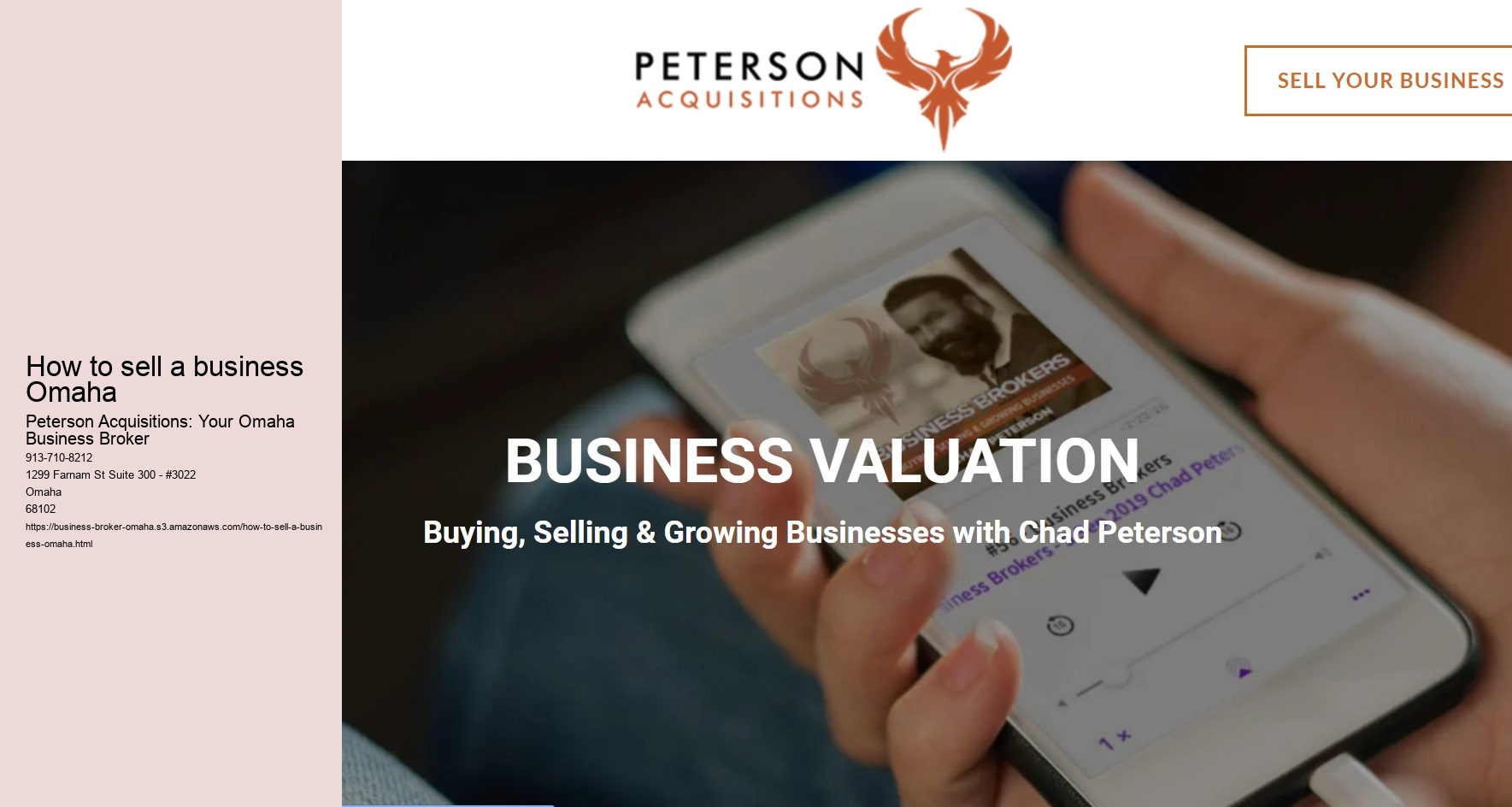Introduction
Omaha, Nebraska, stands as a vivid center of business and market, nestled in the Midwest's abundant landscapes. Experienced business broker Omaha . This city, brimming with financial vigor and a spirit of development, uses a productive ground for both budding business owners and skilled business tycoons. The trip to buying a business in Omaha's vibrant and diverse industry can be intricate and difficult, requiring specialized understanding and a eager understanding of the location's unique organization environment. Below, Peterson Acquisitions, renowned as a top-tier business brokerage firm, comes to be critical. Their deep-rooted knowledge in the Omaha market, combined with a collection of thorough solutions, placements them as an essential companion in guiding you with the intricacies of organization purchase. With Peterson Acquisitions, you acquire not simply a broker, however a specialized ally, ensuring your course to organization possession in Omaha is navigated with skill and understanding.
Understanding the Omaha Business Landscape
Prior to diving into the procedure of purchasing a organization, it's critical to understand Omaha's special service environment. Recognized for its diverse economy, Omaha is home to several Ton of money 500 companies and a thriving area of little and medium-sized ventures (SMEs). Industries ranging from money and insurance policy to agriculture and technology use a fertile ground for business investments.
Why Omaha? This Midwestern treasure provides a engaging case for service financial investment and growth, characterized by its economic resilience and dynamism. Omaha's economic climate, celebrated for its consistent and stable development, gives a calming setting for financiers and entrepreneurs alike. The city, renowned for its prospering organization scene, provides a nurturing environment for start-ups and established businesses. This support is evident in the extensive network of business owners and myriad business growth resources readily available to support and drive company success. Moreover, Omaha's geographical positioning at the heart of the United States is a calculated boon, specifically for organizations in the manufacturing and distribution fields, as it promotes reliable logistics and circulation channels. In this dynamic landscape, Peterson Acquisitions attracts attention as a essential player. Concentrating on the Omaha market, they use bespoke brokerage solutions, underpinned by a deep understanding of the local service environment. Peterson Acquisitions identifies itself by supplying tailored, tactical support to clients, making certain that their service purchase choices are educated and lined up with their certain goals and the unique opportunities that Omaha provides.
Expert Market Analysis
Local Insights: They use valuable insights into the local market trends, aiding you identify rewarding sectors.
Organization Valuation: Their competence in organization appraisal ensures you pay a fair cost for any possible procurement.
Strategic Matchmaking
Determining Opportunities: They keep an substantial listing of available services, matching your passions and financial investment capability.
Due Persistance Assistance: Peterson Acquisitions helps in conducting detailed due persistance, a vital action in evaluating the feasibility of a organization.
Steps to Acquiring a Business with Peterson Acquisitions
Step 1: Identifying Your Objectives
How to sell a business Omaha - Business Assessment
- action coach
- journey
- buy side
How to sell a business Omaha - Business Assessment
- buy side
- competitor
- small business for sale
Step 2: Financial Prep work
A important stage in your financial investment trip. It's vital to completely assess your monetary readiness, including a clear understanding of your budget constraints and abilities. Look into discovering various funding choices readily available, while very carefully considering the prospective monetary ramifications and responsibilities that accompany your investment. This action ensures a strong structure for making enlightened economic decisions.
Step 3: Market Expedition
With Peterson Acquisitions, explore the Omaha business market.
How to sell a business Omaha - journey
- journey
- buy side
- competitor
Tip 4: Choosing the Right Company
When you've determined potential organizations, Peterson Acquisitions will certainly offer thorough evaluation and records on each, aiding in making an educated choice.
Tip 5: Due Persistance
This critical phase involves validating the financials, legal standing, and functional viability of business. Peterson Acquisitions guides you through this complex procedure.
Action 6: Negotiation and Offer
Leverage Peterson Acquisitions' competence in settlement to make a reasonable offer. They will help in structuring the sell a manner in which aligns with your financial and tactical goals.
Action 7: Closing the Deal
Ultimately, Peterson Acquisitions will certainly help with the closing process, guaranteeing all lawful and monetary facets are managed efficiently.
Post-Purchase Shift
Post-purchase, Peterson Acquisitions can lead on shift techniques, making sure a smooth handover and operational connection.
Conclusion
Getting a service in Omaha offers interesting possibilities, and partnering with Peterson Acquisitions can dramatically enhance your opportunities of success. Their know-how, local understanding, and dedicated services offer a comprehensive guide through the complex process of service acquisition. With the right method and support, your entrepreneurial trip in Omaha can be a flourishing and rewarding one.
